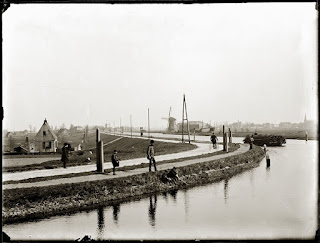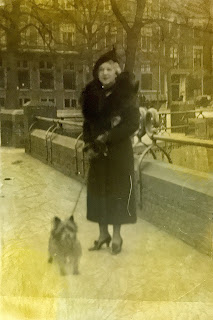Douwe Johannes Beintema - a well to do farmer
She was a well-to-do farmer's daughter - this was a note about my great great grandmother Lijsbert (or Lijsbeth) Beintema in the familytree. Her father was Douwe Johannes Beintema (1779-1840) and the subject of this post prompted by "on the farm" for week 39, 52 ancestors challenge 2018.
Lijsbert (Lijsbeth) was born in 1820. Douwe was forty one years old and a wealthy farmer and property owner. He is listed in many legal documents either as the seller, the buyer, the creditor, or the guarantor.
How did he acquire the means to purchase all this property? Not through subsistence farming. Perhaps he made a good marriage? His father certainly did. He married Jeikjen, daughter of Douwe Kornelis, who purchased Beintema Hûs in 1750, the place where Lijsbert was born. (See also my earlier post The Homestead)
Looking at the historical context it looks like Douwe was born at the right time and in the right place.
For centuries Friesian farmers had proved to be enterprising and more commercially oriented than elsewhere in the Netherlands and Europe. From as early as the 16th century there are signs that farmers in Friesland managed their farms to make a profit, not just feed their families.
Governments in the 16th and 17th centuries also invested in increased infrastructure of roads and waterways in Friesland bringing together urban and rural economies. The last quarter of the 18th century saw great economic growth and development in Friesland and integration of city and rural economies. For example, farmers bought manure from the cities and sold back the wheat for flour for the bread bakers in the city, but for themselves they would use the cheaper rye flour for bread. Both farmers and city folk spent their wealth on luxury consumer goods. Douwe Johannes and his family also profited from this.
Source: http://www.11en30.nu/de-canon-vensters/de-calculerende-boer
A search for documents with his name brings up a list of eighty eight results on the Open Archieven site I like to use. One result catches my eye: Buyer of property on 3rd January 1820 in Westergeest, just four months before Lijsbert was born. I have not yet found the actual document so I can only rely on the citation and details given for this source: purchase of "Zathe en landerijen" - A Manor and fields, purchased for Fl 19,000. A considerable purchase. Was it Beintema Hûs? Possible but I have yet to confirm this.
Nevertheless, Douwe Johannes Beintema is mentioned in the Westergeest village magazine De Foestrumer of March 2005 in a short article about Beintemahûs as the owner of the three buildings belonging to Beintemahûs as well as the Hege Pleats.
Douwe Johannes was a respected member of the community. In 1839 he is listed as a member of the regional council for Kollumerland (Grietenij Kollumerland). He is buried in the cemetery of Westergeest Church. His tombstone inscription:
1840 - on 26 March Douwe Johs Beintema died, in life council member of this municipality, aged 60 years and buried here.
Nevertheless, Douwe Johannes Beintema is mentioned in the Westergeest village magazine De Foestrumer of March 2005 in a short article about Beintemahûs as the owner of the three buildings belonging to Beintemahûs as well as the Hege Pleats.
Douwe Johannes was a respected member of the community. In 1839 he is listed as a member of the regional council for Kollumerland (Grietenij Kollumerland). He is buried in the cemetery of Westergeest Church. His tombstone inscription:
1840 den 26 maart is overleden Douwe Johs Beintema in leven assessor dezer
grietenij in den ouderdom van ruim 60 jaren en ligt hier begraven.
1840 - on 26 March Douwe Johs Beintema died, in life council member of this municipality, aged 60 years and buried here.





Comments
Post a Comment